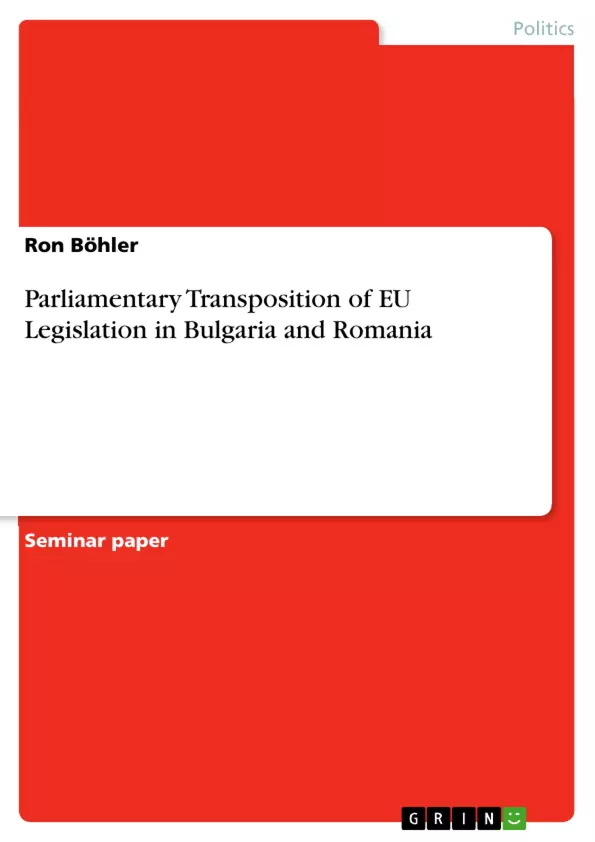This essay is a comparative study of transposition records of EU directives in the case of Bulgaria and Romania in the years following EU accession in 2007. It will also consider the role the respective national parliament has played. It thereby closes an empirical gap in contemporary researches on the topic.
First, this study will review the academic literature on the roles that national parliaments in CEE countries have played after the collapse of the Soviet Union with special reference to transition efforts of these countries. Bulgaria’s and Romania’s cases will be further sketched out. Afterwards, the methodology for evaluating national parliament’s involvement in the transposition of EU directives will be outlined, before turning the attention to the comparative analysis of the two case studies.
The transposition of EU regulations into national legislation is at the heart of the European integration project as this step of the policy process provides for the congruence and non-discrimination of domestic policies among European Union (EU) member states. Compliance with supranational law shall guarantee state practice to common standards within a Union marked by economic disequilibria and political idiosyncracies of each country.
Indeed, empirical studies have revealed that timely transposition of EU directives vary across member countries as well as policy areas. More generally, the transposition of EU law within a fixed deadline is positively correlated to central national preferences and run rather smoothly in issue areas of secondary importance to relevant state actors. In countries of Central and Eastern Europe (CEE) however it has been argued that EU accession would lead to some kind of ‘compliance fatigue’ once the intended goal of EU membership has been reached.
Inhaltsverzeichnis (Table of Contents)
- Introduction
- The Roles of National Parliaments in CEE Countries
- After the Breakdown: Parliaments in Times of Transition
- The Bulgarian & Romanian Parliament in EU Affairs
- Complying with EU Legislation: Theoretical Perspectives
- The Transposition of EU Directives after EU Accession:
A Comparative Study
- Methodology
- Empirical Findings
- Bulgaria
- Romania
- Parliamentary Transposition & Compliance with EU Law Reconsidered
- Conclusion
- References
Zielsetzung und Themenschwerpunkte (Objectives and Key Themes)
This research paper examines the impact of national parliaments on the transposition of EU directives in Bulgaria and Romania, focusing specifically on the period following their EU accession in 2007. It aims to investigate whether national parliaments act as inhibitors or catalysts to compliance with EU law within these two specific CEE countries.
- The role of national parliaments in the transposition of EU directives in CEE countries
- The theoretical perspectives on compliance with EU legislation
- The comparative study of transposition records in Bulgaria and Romania
- The impact of parliamentary transposition on compliance with EU law
- The challenges and opportunities of parliamentary involvement in EU law implementation
Zusammenfassung der Kapitel (Chapter Summaries)
The introduction provides an overview of the importance of transposing EU regulations into national legislation and highlights the need for timely and accurate transposition. The chapter also discusses the challenges of compliance with EU law in CEE countries, particularly in the context of 'compliance fatigue' following EU accession.
Chapter 2 examines the role of national parliaments in CEE countries during the transition period after the collapse of the Soviet Union. It discusses the challenges faced by parliaments in these countries, such as the legacy of a common Soviet past, the need to balance internal and external democratisation demands, and the pressure to modernise political domains and economic infrastructure.
Chapter 3 outlines the methodology used to evaluate the involvement of national parliaments in the transposition of EU directives, setting the stage for the comparative analysis of Bulgaria and Romania in the following chapters.
Chapter 4 presents a comparative study of the transposition records of EU directives in Bulgaria and Romania in the years following EU accession. This section analyzes the empirical findings related to timeliness in both parliamentary and non-parliamentary execution measures.
Schlüsselwörter (Keywords)
The key terms and topics covered in this paper include: EU legislation, transposition, compliance, national parliaments, CEE countries, Bulgaria, Romania, EU accession, parliamentary transposition, democratic deficit, compliance fatigue, comparative study, empirical findings, transition, and European integration.
Frequently Asked Questions
What is the main focus of this study on Bulgaria and Romania?
The study compares the transposition records of EU directives in Bulgaria and Romania in the years following their EU accession in 2007, focusing on the role of their national parliaments.
What is meant by 'compliance fatigue' in the context of CEE countries?
'Compliance fatigue' refers to the theory that Central and Eastern European countries might become less diligent in implementing EU law once the primary goal of EU membership has been achieved.
Why is the transposition of EU directives important for European integration?
Transposition ensures that domestic policies across member states are congruent and non-discriminatory, guaranteeing common standards within the Union.
How do national parliaments influence the implementation of EU law?
The research investigates whether national parliaments act as catalysts that speed up the process or as inhibitors that slow down the implementation of supranational law.
What challenges did CEE parliaments face after the collapse of the Soviet Union?
They had to balance internal democratization demands with external pressures to modernize political and economic infrastructures while overcoming their common Soviet past.
What does the study reveal about timely transposition in Bulgaria and Romania?
The paper analyzes empirical findings to determine how timeliness varies between parliamentary and non-parliamentary execution measures in both countries.
- Quote paper
- Ron Böhler (Author), 2012, Parliamentary Transposition of EU Legislation in Bulgaria and Romania, Munich, GRIN Verlag, https://www.grin.com/document/376560



